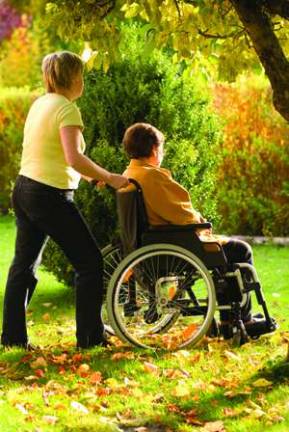Mourning Losses That Are Incremental

By Roy Herndon Smith, Ph.D. A "family caregiver" is a family member or friend who cares for someone who is disabled. Many disabled persons have only one such caregiver. Such solitary caregivers tend to suffer from a great deal of stress and, as a result, are vulnerable to illness. One source of stress, especially for caregivers who are losing a parent, spouse, partner or friend to Alzheimer's or another kind of dementia, is seemingly endless mourning. First, they lose the person who was able to be independent and to take care of himself. Then they lose the person who has been a companion in making decisions and enjoying life. Finally, in the case of someone suffering from advanced dementia, they lose the person who has recognized and known them. The obvious suffering of their loved ones who are losing abilities, independence and parts of themselves sometimes makes it difficult for caregivers even to admit that they too are hurting. "What right do I have to be upset," a caregiver may ask herself, "when my loved one is losing and suffering so much?" A geriatric care manager can help caregivers recognize, accept and express their feelings of mourning and can refer them to caregiver support groups that can help in these ways. Freedom to mourn is freedom to love the person one is losing, to receive from them what they can still give, to care for them with realism, intelligence and tenderness, and to take care of oneself. Denials of mourning by caregivers are common and understandable, but they can have tragic results. A caregiver who cuts herself off from her mourning may not be able to recognize, affirm and enjoy the ways her loved one is still present. For example, even a person with advanced dementia can often, with encouragement, remember and tell stories about his childhood and early life. He will sometimes respond with physical warmth and even playfulness to a loved one whom he does not remember, but whose affectionate touch is familiar. In order to receive such gifts, a caregiver must be able to admit her feelings for and thus her mourning of her loved one. Caregivers sometimes deny the feelings of anger about losing their loved one that is part of mourning. The repressed anger can break out in hurtful ways. For instance, a caregiver may become cold and distant in dealing with his loved one. Or he may find that he is constantly frustrated with and critical of her for what she can no longer do. Often caregivers feel guilty about their anger. They become critical of themselves for what they have not done or are not doing or for their lack of compassion. Such guilt results in a vicious circle. When they attack themselves, caregivers become more exhausted, less able to care, and less able to love, which can lead them to be even angrier with themselves. Caregivers who are caught up in guilt and the denial of mourning and who face the overwhelming demands of caregiving on their time and energy tend to neglect their own needs and health. Too often such neglect leads caregivers to become ill themselves. Getting help with mourning from a geriatric care manager or a support group is thus a way of caring for both one's loved one and oneself. Dr. Herndon is with Community Geriatric Care Management, a wholly owned subsidiary of Foremost Home Care. communitygeriatriccare@gmail.com